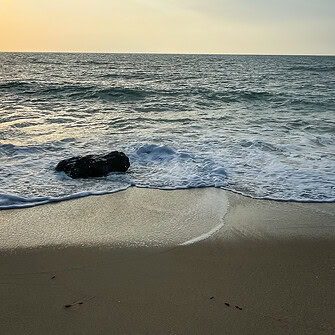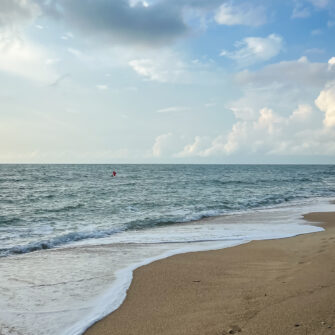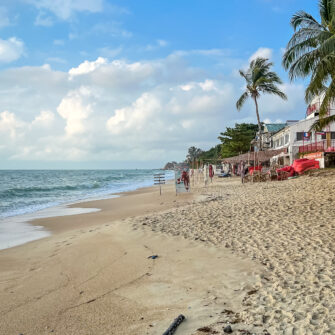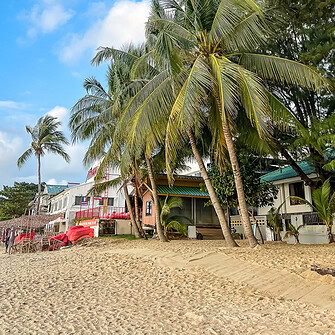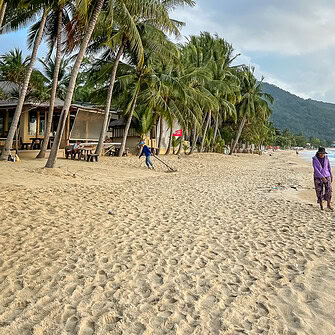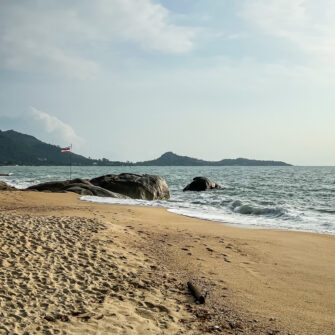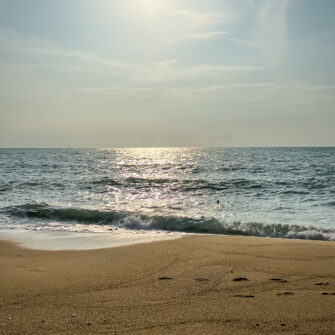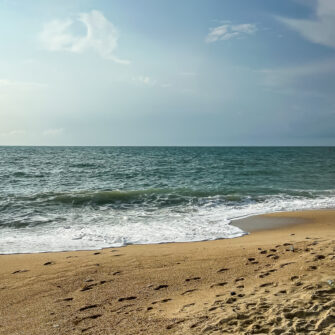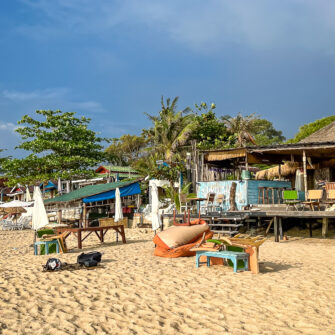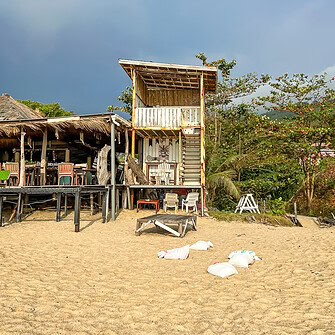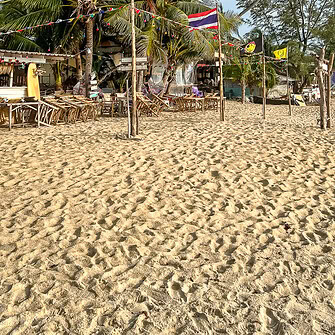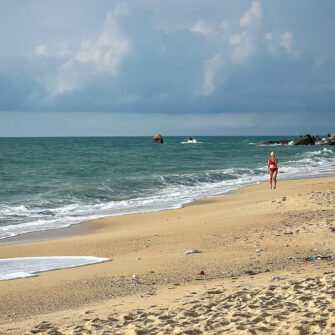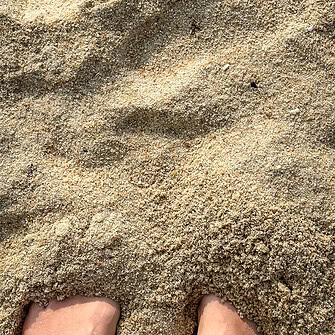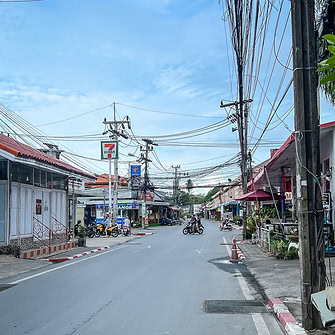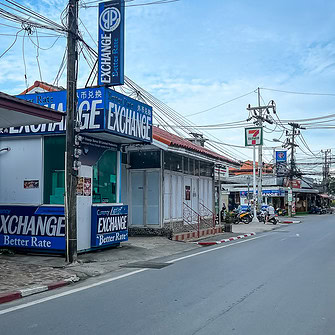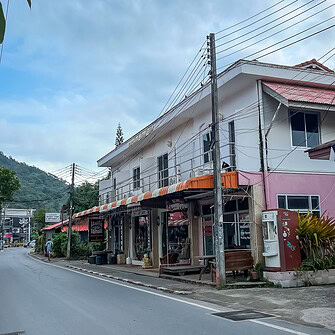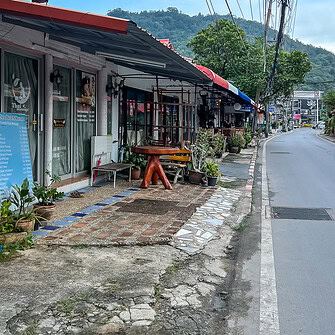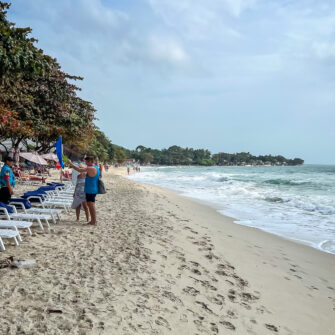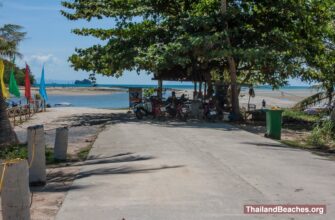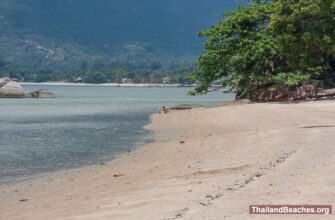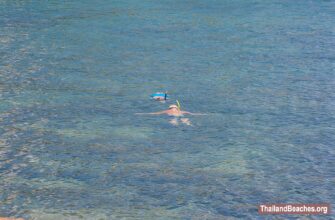Lamai Beach or Lamai is one of the three most famous beaches on Koh Samui alongside Maenam and Chaweng. Lamai can’t be briefly described in one paragraph or shown with a couple of photos taken from one spot.
Unlike the other thirty-odd beaches on Koh Samui, Lamai varies greatly throughout its 3 miles (5 km) stretch running from northwest to southeast. You could say it’s three beaches in one which are roughly divided into Central, Southern and Northern Lamai.
- Beach Overview
- Northern Lamai
- Central Lamai
- Southern Lamai
- Swimming
- Northern Lamai
- Central Lamai
- Southern Lamai
- Sunbeds and Shade
- Northern Lamai
- Central Lamai
- Southern Lamai
- Beach Photos
- Central Lamai
- Southern Lamai
- Amenities
- Northern Lamai
- Central Lamai
- Southern Lamai
- Accommodation
- Northern Lamai
- Central Lamai
- Southern Lamai
- How to Find the Beach
Beach Overview
Northern Lamai
The northern part of Lamai consists of about 1.5 miles (2 km) of winding beach line with consistent width. Northern Lamai starts from Lamai stream then passes by the fishermen’s island, the pier of Le Meridien Koh Samui Resort and ends at the rocky coastline bordering Laem Nan beach.
The sand on northern Lamai is light yellow, coarse and very loose. The finer sand lies further from the water while the coarser sand is near the shoreline.
Trash is only seen near the fishing pier, during rough seas, or early in the morning before the beach has been cleaned. Despite Lamai being one of the busiest beaches on Samui, this doesn’t apply to Northern Lamai due to its shallow waters.
Central Lamai
The central part of Lamai features a 0.6 mile (1 km) stretch of even beach line with consistent width from the foul-smelling river Lamai river to Aloha Resort. At this point in Lamai, the Pongponrat road makes a 90° turn.
The sand in this section of Lamai is light yellow, almost white, very loose with a mixture of coarse yellow sand. Hotels are situated along the entire beach, and they maintain cleanliness in their areas. You’ll only find mess during rough seas or early in the morning before Lamai has been cleaned.
Southern Lamai
The southern part of Lamai consists of about 2000 feet (600 metres) of straight beach line about 150 feet (40 metres) wide near the boulders of Bill Resorand narrowing to 50 feet (15 metres) towards the Hin Ta Hin Yai rocks. The sand in this section of Lamai is light yellow, almost white, very loose and mixed with coarse yellow sand. The beach here on Koh Samui is located at the foot of a rocky mountain slope.
Thanks to the steepness of the slopes, there aren’t as many hotels in southern Lamai as in the central part, so the density of people is slightly lower here. But this doesn’t apply to the 160-feets (50 m) section of beach opposite Bill Resort, where huge, round rocks stick out from the middle of the sand. Due to the distance between the rocks, the beach in this spot narrows to 30 feets (10 metres), taking on a steep, precipitous appearance. The coarse sand is lined with hotel sunbeds, and this part of Lamai is rather cramped.
Swimming
Northern Lamai
Northern Lamai is fundamentally different from the central and southern parts due to its seabed. Starting from the sandy patch under the water washed up by foul-smelling river and all the way to the rocks bordering Laem Nan, this is the shallowest sea area on Lamai. The bottom is covered with stones of various sizes, coral fragments and silt.
Getting into the water in the northern part of Lamai is far from ideal. It’s better not to wade through the water without special shoes. Swimming is only possible until the tide starts going out and even then you’ll be sitting on your haunches.
Due to its depth, the appearance of northern Lamai suffers greatly during low tides. The sea recedes by 15-30 feet (5-10 metres) reducing the already shallow depth and in some places exposing the seabed and marine life.
The situation with waves in northern Lamai is significantly better than in other areas but swimming here is still not possible during bad weather. At the entrance near the bridge over the creek there’s a sign warning about dangerous underwater currents on the beach.
Central Lamai
The water entry in the central part of Lamai is perfect. It’s the best sandy entrance to the sea on the island, with a fairly steep shoreline where the depth increases instantly.
16 feet (5 metres) from the beach, you’ll already be out of your depth. Thanks to this depth, Lamai doesn’t suffer during low tides. The sea recedes by only 2-3 metres, not affecting the beach characteristics in this area. However, with a slight wind, there can be decent waves at Lamai which become dangerous during stronger winds.
Southern Lamai
Getting into the water on the southern section of Lamai is hindered by rocks and coral growth along the entire stretch, and under the cliffs at the beach boundaries, it’s quite deep. Thanks to this depth, southern Lamai doesn’t suffer during low tides.
The sea recedes literally 6-10 feet (2-3 metres), not affecting the characteristics of the beach in this section at all. However, with a slight wind, there can be decent waves at southern Lamai, which become dangerous when the wind is strong enough.
Sunbeds and Shade
Northern Lamai
The width of the beach varies from 15 to 100 feet (5-30 metres). In front of each hotel there are sunbeds and umbrellas that can be rented. Trees grow very sparsely but there are some magnificent leafy specimens under whose shade you could hide an entire village.
Central Lamai
The beach width reaches 40 metres, which are exposed to the sun throughout the central part of Lamai. Sunbeds and parasols are available for rent in front of each hotel.
Trees grow very sparsely at the very edge of the shore where the sand ends and the grass begins. In central Lamai, there isn’t a single source of natural shade closer than 30 metres from the water.
Southern Lamai
The width of the beach ranges from 15 to 40 metres of sand, which lies under the sun throughout the southern part of Lamai without any protection. Some hotels have sunbeds and umbrellas set up, which you can use for a rental fee.
Trees grow very sparsely at the very edge of the shore where the sand ends and the grass begins. In southern Lamai, there isn’t a single source of natural shade at the water’s edge.
Beach Photos
Central Lamai
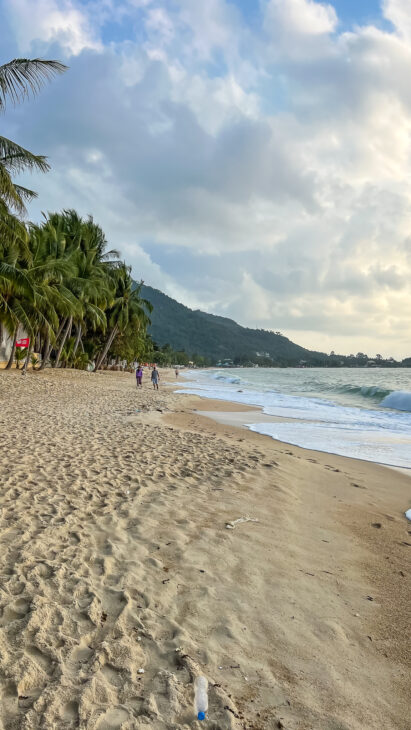
Southern Lamai
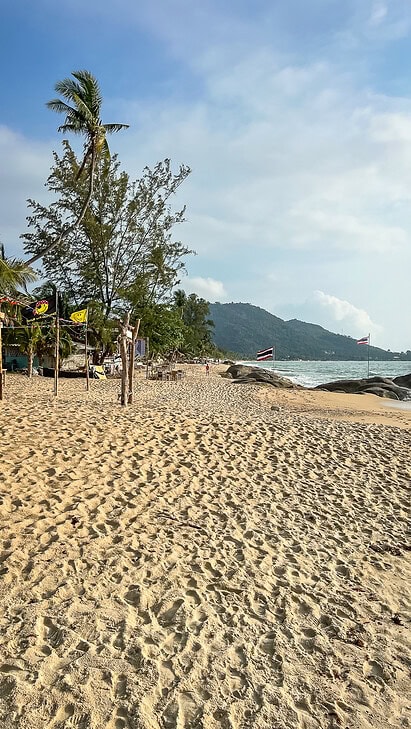
Amenities
Northern Lamai
Northern Lamai is located on the outskirts of the area’s daytime and nightlife. All of Lamai’s amenities are just a minute’s drive away. Approximately in the middle of Northern Lamai, there’s a huge triangular pit dug in the seabed for boat parking. The extracted ground is piled up in the sea as massive artificial breakwaters.
The size of one of these ridges allowed for the construction of a small hut which became the headquarters of local fishermen. The beach near foul-smelling river is constantly damaged by wastewater during the rainy season. And it doesn’t just wash out the small gully that you can cross on a log but erodes up to 160 feets (50 metres) of the beach.
Central Lamai
Mini-markets, Lotus’s hypermarket, night and day markets, banks, petrol stations, coffee shops, cafes, restaurants offering cuisines from around the world, vehicle and bicycle rentals, children’s and clothing shops, laundries, spa salons, massage parlours and a red-light district, a water park, a children’s entertainment centre – Lamai is fully equipped with everything necessary for a complete, interesting holiday and stay in Koh Samui.
The central part of Lamai is located at the very epicentre of the area’s day and night life. At night, you might be disturbed by music from bars and discos. The beach itself offers all possible water activities available in Koh Samui. Jet skis, banana boats, kayak rentals. Numerous bars and restaurants, street vendors and masseuses.
Among the nearby attractions in Lamai are:
- Lamai Cultural Centre (Wat Lamai Cultural Hall)
- Valentine Stone
- Overlap Stone
- Grandmother and Grandfather Rocks (Hin Ta Hin Yai)
Southern Lamai
Mini-markets, Makro hypermarket, Orthodox church – these form the basic infrastructure of the southern part of Lamai. For a greater variety of establishments, you need to head to the central part of Lamai, which is like a small town.
The southern part of Lamai is located on the outskirts of this popular beach, so you needn’t worry that your child will be disturbed at night by the shouts of drunk foreigners and ladies of the night. There are few beach activities here, with almost no rentals for jet skis, kayaks, and inflatables. This part has an air of neglect and abandonment, in stark contrast to the bustling Central Lamai.
Accommodation
Northern Lamai
All the space between the ring road and the sea is built up with hotels, just over a dozen, the largest of which is Le Meridien Koh Samui Resort. Independent accommodation rental is only possible deeper inland. Lamai is one of the areas on Koh Samui with the most private housing options.
Notable hotels on the beach include:
- Seaview Paradise Beach & Mountain Villas
- Pao Jin Poon Pool Villa
- Beach Republic, Koh Samui
- Lamai Bay View Resort
Central Lamai
There’s only one old vacant lot in central Lamai, about 160 feets (50 metres) of cleared area, and by 2019 there were already just pitiful square metres left of it. Everything is being filled with construction debris, levelled and built up with resorts.
All the space behind Beach Road in Lamai is occupied by house for rent. Self-catering accommodation is only possible deeper into the island, on the outer side of the Ring Road. This is one of the richest areas for private accommodation in Koh Samui.
I personally stayed at Lamai Coconut Beach Resort near the beach and had a great experience. Notable hotels include:
- Melia Koh Samui
- Lamai Wanta Beach Resort
- Lamai Inn 99 Bungalows
Luxury hotels with high ratings include:
- Pavilion Samui Villas & Resort
- The Privilege Hotel Ezra Beach Villas
Southern Lamai
The 1000-feets (300 m) space between the sea and the ring road is occupied by hotels. Beyond the ring road are mainly shops and occasional houses. This is the least developed section of Lamai, so for accommodation, you’ll need to head towards the centre of the village.
Closer to the Hin Ta Hin Yai rocks, you start to come across vacant lots, and resorts located in this area look unpresentable. You’ll even find simple fishermen’s houses right on the seashore.
Notable hotels include:
- Bill Resort
- Beluga Boutique Hotel
- Sunrise Bungalow
- Rummana Boutique Resort
How to Find the Beach
Access to the beach is possible through the territory of any hotel but if you don’t want to deal with security or administration you can always turn into one of the two lanes that lead directly to the sea. One of the convenient and successful spots is the turn-off opposite the fishermen’s basin. There’s also a decent-sized parking area for vehicles there.

